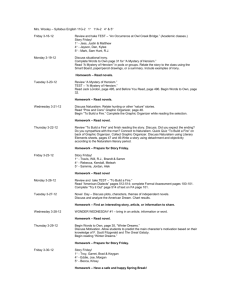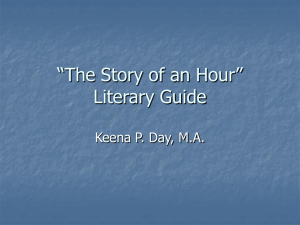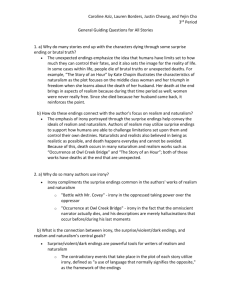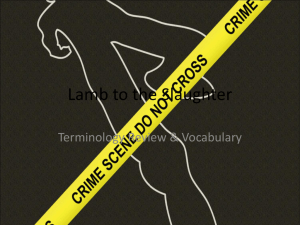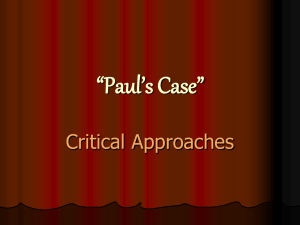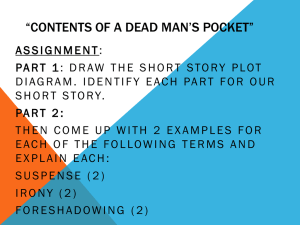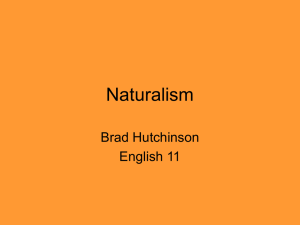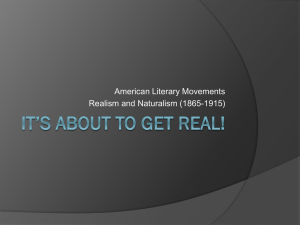General Questions for all Stories Alex, Grace, Samantha, Tanner
advertisement
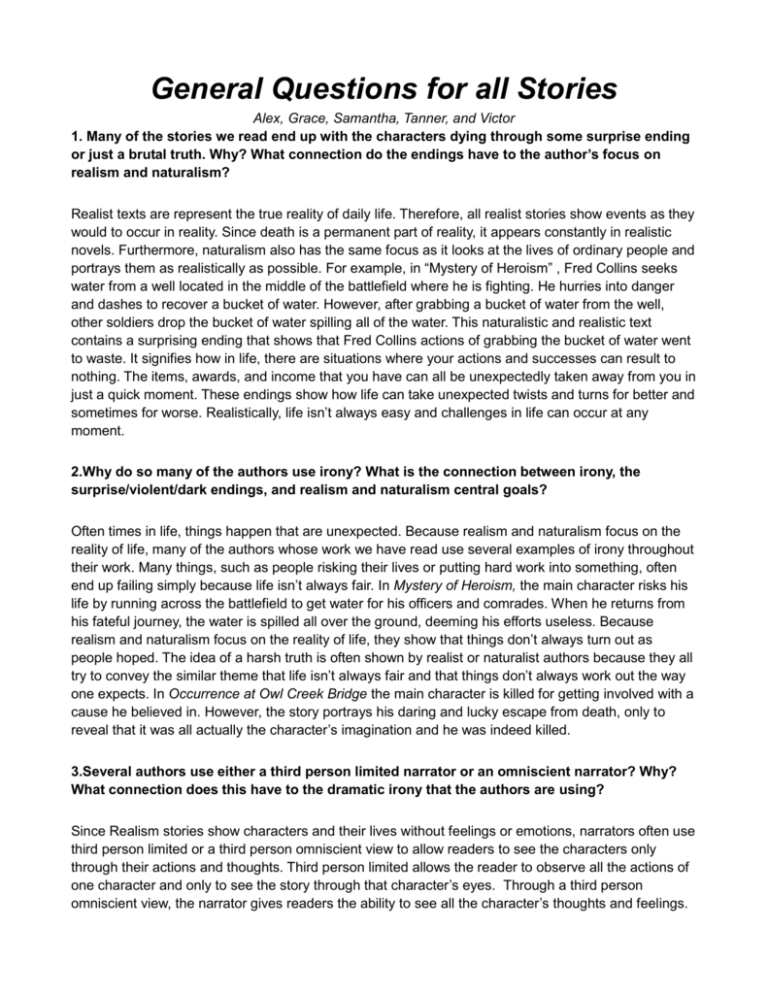
General Questions for all Stories Alex, Grace, Samantha, Tanner, and Victor 1. Many of the stories we read end up with the characters dying through some surprise ending or just a brutal truth. Why? What connection do the endings have to the author’s focus on realism and naturalism? Realist texts are represent the true reality of daily life. Therefore, all realist stories show events as they would to occur in reality. Since death is a permanent part of reality, it appears constantly in realistic novels. Furthermore, naturalism also has the same focus as it looks at the lives of ordinary people and portrays them as realistically as possible. For example, in “Mystery of Heroism” , Fred Collins seeks water from a well located in the middle of the battlefield where he is fighting. He hurries into danger and dashes to recover a bucket of water. However, after grabbing a bucket of water from the well, other soldiers drop the bucket of water spilling all of the water. This naturalistic and realistic text contains a surprising ending that shows that Fred Collins actions of grabbing the bucket of water went to waste. It signifies how in life, there are situations where your actions and successes can result to nothing. The items, awards, and income that you have can all be unexpectedly taken away from you in just a quick moment. These endings show how life can take unexpected twists and turns for better and sometimes for worse. Realistically, life isn’t always easy and challenges in life can occur at any moment. 2.Why do so many of the authors use irony? What is the connection between irony, the surprise/violent/dark endings, and realism and naturalism central goals? Often times in life, things happen that are unexpected. Because realism and naturalism focus on the reality of life, many of the authors whose work we have read use several examples of irony throughout their work. Many things, such as people risking their lives or putting hard work into something, often end up failing simply because life isn’t always fair. In Mystery of Heroism, the main character risks his life by running across the battlefield to get water for his officers and comrades. When he returns from his fateful journey, the water is spilled all over the ground, deeming his efforts useless. Because realism and naturalism focus on the reality of life, they show that things don’t always turn out as people hoped. The idea of a harsh truth is often shown by realist or naturalist authors because they all try to convey the similar theme that life isn’t always fair and that things don’t always work out the way one expects. In Occurrence at Owl Creek Bridge the main character is killed for getting involved with a cause he believed in. However, the story portrays his daring and lucky escape from death, only to reveal that it was all actually the character’s imagination and he was indeed killed. 3.Several authors use either a third person limited narrator or an omniscient narrator? Why? What connection does this have to the dramatic irony that the authors are using? Since Realism stories show characters and their lives without feelings or emotions, narrators often use third person limited or a third person omniscient view to allow readers to see the characters only through their actions and thoughts. Third person limited allows the reader to observe all the actions of one character and only to see the story through that character’s eyes. Through a third person omniscient view, the narrator gives readers the ability to see all the character’s thoughts and feelings. This allows the reader to understand the different situations and motivations that each character possesses in the story. Furthermore, dramatic irony is created from having omniscient viewpoints. Readers are able to understand the motivations of one character (in a third person limited viewpoint) or the intentions of all the characters (in a third person omniscient viewpoint) that allows the reader to know information that characters have kept hidden from each other. Dramatic irony is created directly from these viewpoints where the audience is able to understand situations or events that aren’t completely understood by other characters in the story. In “Story of an Hour”, Kate Chopin uses third person limited to give the audience a window into Mrs. Mallard’s mind and her thoughts after the supposed death of her husband. This allowed the audience to understand the dramatic irony at the end of the story when Mrs. Mallard dies of a heart attack after seeing that her husband is still alive. The audience understood, through third person limited view, that Mrs.Mallard was excited to escape the cage of marriage she was trapped in with Mr. Mallard. When Mrs. Mallard actually dies at the end of the story, she is still able to escape from the traps of marriage but through death. The readers are able to understand this escape while other characters believed she died from “[a] joy that kills” (638 Chopin). 4.How does knowledge, instinct, and experience shape the characters lives? What role does pride play in all three texts? What about dignity or morality? Darwin’s theory about the “survival of the fittest” is seen in all three texts-- how? What enables one to survive? What is power in all of theses stories? How are the characters limited or trapped by their environments? Knowledge, instinct, and experience all shape the characters lives in many ways. One way being that what you know and have experience affect the decisions that you make. For example, in “Mystery of Heroism,” when Fred Colins goes to get water from the middle of the battlefield, he made this decision because he knew that even though he would be risking his own life, one cannot survive without water. Because one cannot survive without water, Fred Collins felt it was necessary to risk his life in order to survive, demonstrating “survival of the fittest”. In “Occurrence at Owl Creek Bridge” the main character is about to die, but his mind makes him believe he has escaped. The happiness of escaping helps the character deal with death better than a person who accepted his reality. Although the main character didn’t actually survive, it helped him survive through the situation better than if what was happening had sunk in. Pride also has a big impact in the text. In “Mystery of Heroism,” Collins wanted to prove a point when others scorned him at the thought of him going to get water. Because of this, his pride gave him even more of a reason and more drive to try to get the water. His pride also plays into his dignity because if he hadn’t succeeded or didn’t even bother trying, he would have lost some dignity and some pride in himself. Power is also key in all of the stories. An example is in “The Yellow Wallpaper” because Charlotte Gilman goes crazy due to the wallpaper, but in the end of the story she is able to find the courage and power to tear it down. The water in “Mystery of Heroism” would give Fred the power and strength of carry on, so it powers him. Power in many situations give characters the drive to accomplish certain things. Many characters in the stories we’ve been reading are trapped by their environment. The most notable one is in “The Yellow Wallpaper”. The main character is confined in a nursery due to her depression. Her husband keeps her on strict lock down and doesn’t let her do the things she wants. She is trapped and it causes her to go crazy. In Occurrence at Owl Creek Bridge , the main character is trapped by a death sentence and hanged.
